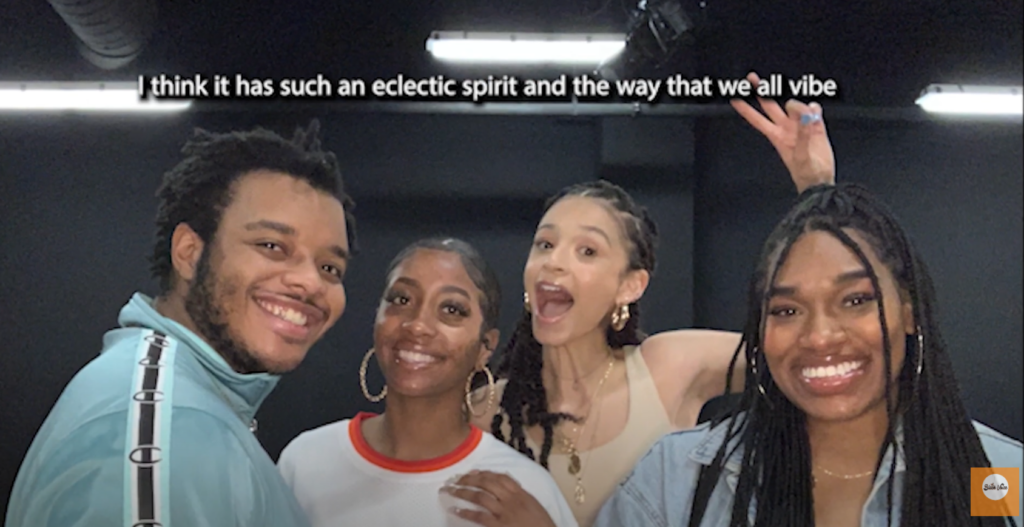
When Nile Lansana (BA’21) and his peers were first approached in Fall 2020 to create a documentary about The Black Voice, they were conducting interviews within a month.
Lansana was the co-Editor-in-Chief at the time, alongside Chelsea Hylton (BA’21) and Managing Editor Enjoyiana Nururdin (BA’21). The 2020-21 school year would be The Black Voice’s 50th anniversary, and the staff was eager to showcase all of the crucial work that’s been done over the years.
“We the Vision” premiered on March 1 at the Marquee Theater at Union South. The documentary was directed and produced by Lansana and included interviews with a long list of TBV alumni and current members.
Lansana, Hylton and 2021-22 Editor-in-Chief Lauryn Azu (BA’22) conducted all of the interviews for the documentary. Lansana said most of his interviews were done over Zoom due to the pandemic. The film was primarily put together during the entirely virtual school year. While this was an adjustment, Lansana acknowledged that it was the reality of the situation, but one that will end up being monumental.
“In a couple of years, we’re going to think about this time being really important and we’re going to understand the impact of what we were able to do with how much capacity we were able to have and what we did with that,” Lansana said.
Lansana had been a part of The Black Voice since his first year on campus. He had been introduced to the publication by friend and former Editor-in-Chief
Nia Scott (Art BS’20) prior to committing to UW-Madison. Scott had mentioned to Lansana that if he was looking to write, he should join The Black Voice. As soon as he was on campus, he was attending his first meeting.
Throughout all four years of college, Lansana held a variety of different leadership positions. He also served as the chapter co-president of the National Association of Black Journalists. Prior to “We the Vision,” Lansana had no experience editing or directing, but the support and trust given to him by The Black Voice community made him feel more confident in himself.
Lansana said it was beautiful to reconnect with alumni and watch them revisit the work they did during their time on campus.
“When you’re at UW, you don’t have a lot of time to take in what you’re doing because it’s always about what’s next…but what was beautiful about the interviews was that I got to be in this moment with people who I’m really close with and who are super integral to my journey at UW and as a journalist,” Lansana said.
“One of the things I wanted the documentary to be was a moment for us to sit in what we’ve done and been doing,” Lansana said. “Especially as students from marginalized communities, we’re not going to be celebrated as loudly and consistently unless we do it ourselves.”
The Black Voice originally came out of the 1969 Black student strikes on UW-Madison’s campus. Lansana shared that “We the Vision” falls perfectly in line with the core values of the publication since its inception by continuing to provide a space for Black students to tell their stories. The documentary shines a light on the organization’s formation and its history.
In the Spring 2021 semester, The Black Voice published its first print issue in nearly 50 years. The publication printed its last issue in 1973 and only revitalized in 2014 and had been publishing online since then.
“The story of The Black Voice and ‘We the Vision’ is such an unsung narrative on UW-Madison’s campus,” Lansana said. The movie illustrates a “powerful, important lineage of Black storytellers on this campus that have been doing the work.” One of Lansana’s core motivations for making the movie was to make sure The Black Voice was never forgotten again.
Lansana hopes the documentary will showcase the “compassion the students who come through The Black Voice have for each other and the platform.” The Black Voice encouraged Lansana to constantly step out of his comfort zone and explore different passions. The alumni included in the film have all gone on to pursue a passion that The Black Voice enabled.
“It’s been amazing to see how that informal mentorship that was rooted in The Black Voice has blossomed to where it is now,” Lansana said. “I’m so excited to see it continue not only through myself but through the students at TBV on campus now.”
Lansana described the process of creating “We the Vision” as a labor of love. Lansana is back in Chicago, where he coaches soccer and is considering his next steps. With the release of “We the Vision,” he is now able to move on.
“I felt like I couldn’t move on from UW and The Black Voice without making this happen and without doing justice and honoring all of the incredible people and all of the amazing work that has been created and the people who come through TBV,” said Lansana.